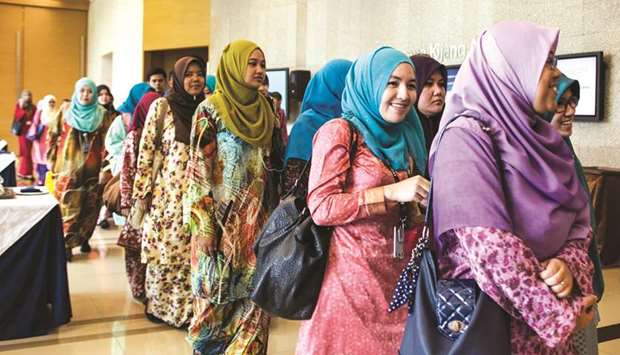The three predominantly Muslim countries out of ten in the Association of Southeast Asian Nations (Asean), namely Malaysia, Indonesia and Brunei, are on the way to form a new hub for Islamic finance and the wider halal industry through their current roadmaps to develop the sector.
Malaysia, which is already one of the countries with the largest Islamic finance industry globally, is currently moving towards the conclusion of its Financial Sector Blueprint 2011-2020 which aims at establishing the country as an international centre for Islamic finance. The country has built a highly developed and comprehensive Islamic financial system, supported by a robust regulatory and supervisory regime and a broad spectrum of ancillary services and increased liberalisation, which intensifies the internationalisation process, reinforced by more developed Islamic financial markets and financial infrastructure globally.
In Malaysia, financing based on Islamic principles should reach 40% of total financing in 2020, up from 29% in 2010, underpinned by greater outreach and product innovation. The Islamic banking industry has expanded from 6% to 22% of the overall banking sector in terms of assets in the last decade, while the sukuk market now accounts for 55% of the debt securities market. The sector has also been supported by the creation of industry bodies such as the Islamic Banking & Finance Institute Malaysia, a one-stop Islamic finance reference centre for the industry and academia; the International Centre for Education in Islamic Finance, Malaysia’s global university of Islamic finance; the International Shariah Research Academy for Islamic Finance and a single reference body for Shariah matters, the Shariah Advisory Council of the country’s central bank.
All this was augmented by a five-year Islamic fund and wealth management initiative, rolled out in 2017, as well as a liquid and broad range of product offerings.
Indonesia is this year reaching the end of the cycle of it Islamic finance roadmap 2017-2019 which has set clear policy directions and priority programmes such as strengthening and harmonising regulations and supervision in the sector; enhancing the quantity and quality of human resources and information technology; improving service quality and product diversity; and establishing a central Shariah committee for Islamic finance with representatives from the government, the financial supervisory authority and the central bank. Getting Islamic banks involved in the management of government funds and government-owned enterprise funds; setting guidelines for taxation, regulation and stress tests for Islamic finance institutions, and, in general, enhancing literacy in Islamic finance among the population and strengthen the positioning, differentiation and branding of Islamic banks are supporting the industry.
According to Muliaman Darmansyah Hadad, chairman of Indonesia’s Financial Services Authority, the roadmap – which is actually accompanied by two others for the Shariah capital market and the Shariah non-bank financial industry – should set the fundamentals to substantially increase the current market share of Islamic finance in Indonesia, which is still low at about 5% of assets, as well as increase the limited variety of products and reduce the lack of knowledge about Shariah-compliant finance.
The small nation of Brunei has also set itself ambitious goals for Islamic finance in its Financial Sector Blueprint 2016-2025 with a key focus on strengthening the country as an international Islamic finance hub with a more diverse foreign presence and a higher level of foreign participation in the domestic Islamic financial markets, particularly in sukuk and takaful. This involves the introduction of more innovative Shariah-compliant financial products and services that meet the more diverse global demands for Islamic finance solutions.
The eventual aim is to leverage Brunei’s Islamic finance credentials by entering joint-ventures with international financial institutions such as fund management firms and takaful operators by providing an enabling environment for asset managers to bring Islamic funds from worldwide markets into Brunei for Shariah-compliant rating and management for further global distribution.
And Brunei is off to a good start. According to the Autoriti Monetari Brunei Darussalam, the country’s Islamic banking assets were valued at more than $11.2bn as per latest available figures in 2017, compared to $10.9bn in 2016. This marks 64% of the country’s total banking assets, maintaining Brunei’s rank as one of the top ten Islamic finance markets globally in terms of domestic market share.
Taking all three countries together, there is a target market for Islamic finance and a broader halal industry of a combined population of close to 300mn people, which is almost half the total population in Asean, underlining the opportunities the sector entails.

Delegates wait in line for a seminar at the Global Islamic Finance Forum in Kuala Lumpur (file). Malaysia, which is already one of the countries with the largest Islamic finance industry globally, is currently moving towards the conclusion of its Financial Sector Blueprint 2011-2020 which aims at establishing the country as an international centre for Islamic finance.
